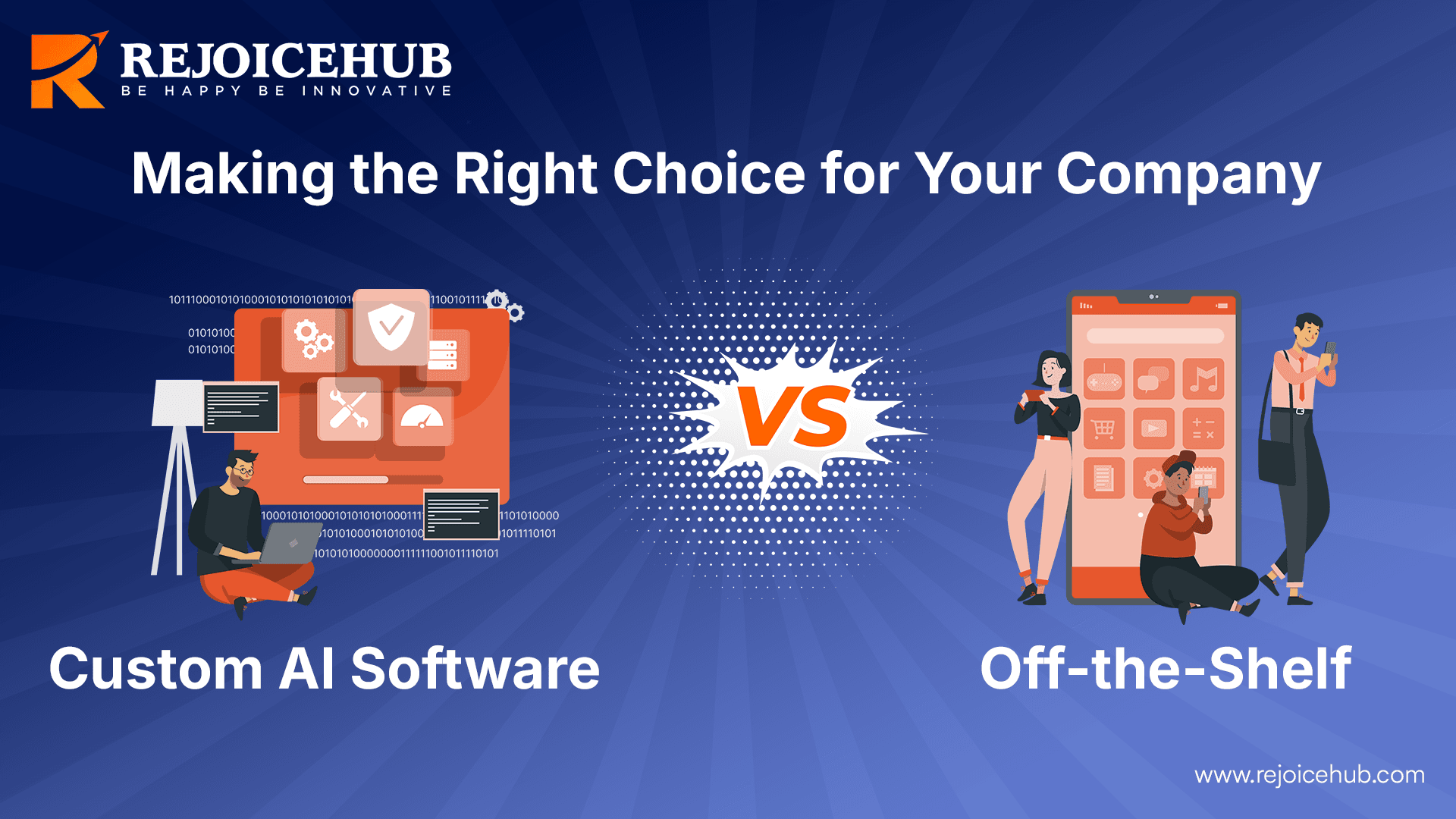
Choosing between custom AI software and off-the-shelf solutions can make or break yourcompany's digital transformation journey. Custom AI software represents tailor-made solutions built specifically for your business needs, while off-the-shelf AI offers ready-to-use applications designed for general business requirements.
The stakes are high when selecting your AI approach. Your choice impacts:
- Operational efficiency
- Cost management
- Competitive advantage
- Implementation speed
- Long-term scalability
This guide walks you through the critical aspects of both custom and off-the-shelf AI solutions. You'll discover how each option aligns with different business scenarios, understand the key factors influencing your decision, and learn from real industry examples. We'll explore cost considerations, development timelines, and potential challenges you might face with each approach.
By the end of this article, you'll have a clear framework to evaluate which AI solution best fits your company's unique needs, resources, and long-term objectives.
Understanding Custom AI Software
Custom AI software is a tailored technological solution designed specifically for your business needs. These customized AI solutions work smoothly with your current systems, processes, and data infrastructure.
Perfect Alignment with Business Needs
- Designed to address specific operational challenges
- Optimized for your unique workflows
- Built around your existing tech stack
- Complete Control and Ownership
- Full access to source code
- Ability to modify and update features
- Proprietary algorithms remain your intellectual property
Enhanced Security and Compliance
- Built-in compliance with industry regulations
- Custom security protocols
- Direct control over data handling
- Scalability and Adaptability
- Grows with your business needs
- Easy integration of new features
- Flexible architecture for future expansion
Enhanced Security and Compliance
- Built-in compliance with industry regulations
- Custom security protocols
- Direct control over data handling
- Scalability and Adaptability
- Grows with your business needs
- Easy integration of new features
- Flexible architecture for future expansion
Your proprietary AI solution can create significant market differentiation. Custom-developed algorithms learn from your specific data sets, creating unique insights unavailable to competitors using standard solutions.
Resource Investment
- Higher upfront development costs
- Extended development timelines (3-12 months typical)
- Need for specialized AI development expertise
- Ongoing Maintenance
- Regular updates and optimization required
- Internal technical team needed
- Continuous training and refinement of AI models
- Development Complexity
- Complex project management
- Risk of scope creep
- Need for extensive testing and validation
Custom AI development requires a significant investment but offers unmatched potential for businesses looking to use AI as a key competitive advantage. The ability to create unique solutions tailored to specific needs can greatly improve operational efficiency and open up new revenue opportunities.
Exploring Off-the-Shelf AI Software
Off-the-shelf AI software represents pre-built, ready-to-use solutions designed to address common business needs. These standardized applications come with predefined features, user interfaces, and integration capabilities, making them accessible to organizations without extensive technical expertise.
-
Subscription-based pricing models (SaaS)
-
Regular updates and maintenance by the provider
-
Standard feature sets across all customers
-
Pre-built integrations with popular platforms
-
Built-in security measures and compliance features
-
Quick Implementation: You can deploy these solutions within days or weeks, not months
-
Cost-Effectiveness: Predictable monthly costs without heavy upfront investment
-
User-Friendly Interface: Minimal training required for team adoption
-
Proven Technology: Battle-tested features used by multiple organizations
-
Ongoing Support: Access to vendor expertise and regular updates
- Customer service chatbots
- Email marketing automation
- Social media content analysis
- Basic image recognition
- Sales forecasting
- Standard document processing
- Rigid Architecture: Limited ability to modify core functionalities
- Integration Constraints: May not work seamlessly with legacy systems
- Data Control: Your data resides on third-party servers
- Feature Lock-in: You depend on vendor roadmap for new capabilities
- Scalability Ceiling: Performance limitations under high-volume scenarios
Pre-built AI solutions work best for companies needing standard functionalities in common business areas. Small to medium-sized businesses often find these solutions sufficient for their initial AI implementation needs. E-commerce platforms use off-the-shelf product recommendation engines, while marketing teams rely on pre-built social media analytics tools.
The standardized nature of these solutions means you share the same features with competitors. Your data handling capabilities remain confined to the provider's infrastructure, raising potential privacy and security considerations in regulated industries.
Key Factors to Consider When Choosing Between Custom and Offthe-Shelf AI
Making the right choice between custom and off-the-shelf AI requires a thorough evaluation of several critical factors. Here's what you need to assess:
- How specialized are your operational workflows?
- Do you need AI solutions that match specific industry regulations?
- Are your current processes significantly different from standard industry practices?
- Initial development costs vs. subscription fees
- Hidden expenses (maintenance, updates, training)
- ROI expectations and timeline
- Available internal resources for implementation
- Project urgency and deployment deadlines
- Training period for staff adaptation
- Integration timeline with existing systems
- Market competition pressure
- Expected user base expansion
- Data volume growth projections
- Geographic expansion plans
- Future feature requirements
- Sensitive data handling requirements
- Industry-specific regulations
- Data storage location restrictions
- Security protocol requirements
Your business might need custom AI if you:
- Have unique processes that off-the-shelf solutions can't address
- Require complete control over data handling
- Plan significant scaling in the next 2-3 years
- Have specific compliance requirements
Off-the-shelf AI might be suitable when you:
- Need quick implementation
- Have standard business processes
- Work with limited technical resources
- Operate under tight budget constraints
The right choice depends on your specific combination of these factors. A healthcare startup might prioritize compliance and customization, while a small retail business might focus on quick deployment and cost-effectiveness.
Industry Use Cases Favoring Custom or Off-the-Shelf AI
Different industries have distinct AI requirements based on their operational complexity and regulatory environment. Let's examine specific sectors and their preferred AI approaches:
- Fintech: Complex fraud detection algorithms, personalized risk assessment models, realtime trading systems, regulatory compliance automation
- Healthcare: Patient data analysis, medical imaging interpretation, drug discovery platforms, personalized treatment recommendations
- Manufacturing: Predictive maintenance systems, quality control automation, supply chain optimization, custom robotics control Retail: Customer service chatbots, inventory management, basic sales forecasting, standard recommendation engine
- E-commerce: Shopping cart abandonment prevention, product categorization, basic customer segmentation, standard email marketing automation
- Small Business: Social media management, basic customer analytics, standard CRM systems, generic market analysis tools
The complexity of financial transactions and healthcare data processing demands custom AI solutions to ensure security, compliance, and precision. Retail and e-commerce operations often succeed with standardized AI tools that handle common business processes effectively.
The Hybrid Approach: Combining Customization with Ready-Made Solutions
A hybrid AI implementation offers businesses the best of both worlds - combining pre-built AI components with custom-developed features. This balanced approach lets you leverage existing AI solutions while adding tailored functionalities specific to your business needs.
Key Benefits of Hybrid AI Solutions:
- Reduced development time through ready-made core component
- Lower initial costs compared to fully custom solution
- Flexibility to customize critical business processes
- Scalability to adapt as your needs evolve
You can start with an off-the-shelf AI platform as your foundation, then build custom layers on top to address specific requirements. For example, a customer service chatbot might use a prebuilt natural language processing engine while implementing custom workflows and responses unique to your brand.
Common Hybrid Implementation Strategies:
- Using API integrations to connect off-the-shelf AI with custom applications
- Customizing pre-built AI models with your proprietary data
- Adding bespoke features to extend standard AI functionality
- Creating custom user interfaces for ready-made AI backends
This balanced approach works well for companies that need specialized features but want to minimize development complexity and costs. The hybrid model lets you prioritize customization for mission-critical processes while using standard solutions for general AI capabilities.
Practical Steps for Making the Right Choice for Your Company
Selecting the right AI solution requires a systematic approach. Here's a practical roadmap to guide your decision-making process:
- Research existing AI solutions in your industry
- Identify competitors' technology choices
- Document gaps between available solutions and your needs
- Create a comparison matrix of features vs. requirements
- Schedule stakeholder interviews across departments
- Map current business processes and pain points
- Set clear metrics for succes
- Establish timeline expectations and budget constraints
- Evaluate your technical team's expertise
- Document existing infrastructure compatibility
- List available resources for implementation
- Identify training needs for staff
- Create criteria for potential technology partners
- Check partner track records and case studies
- Request detailed proposals and pricing structures
- Assess communication and support capabilities
- Design a maintenance schedule
- Budget for future upgrades
- Plan for data migration and backup
- Create contingency protocols
- Document potential security vulnerabilities
- Check compliance requirements
- Assess scalability limitations
- Calculate total cost of ownership
Your decision-making process should prioritize solutions that align with your company's growth trajectory. Consider starting with a pilot project to test assumptions and gather real-world data before full implementation. Regular check-ins with stakeholders during the selection process help ensure continued alignment with business objectives and user needs.
Conclusion
Choosing between custom AI software and off-the-shelf solutions is an important decision that will impact your company's future. To make the right choice, you need to have a clear understanding of
- Your business goals and growth plans
- The resources and technical skills you have available
- Your position in the market and any advantages you have over competitors
- Your data security needs
- The timeline for implementing the AI solution
Custom AI software offers flexibility and a competitive advantage for businesses with unique processes. On the other hand, off-the-shelf solutions are quicker to implement and more costeffective for standard operations. In some cases, a combination of both options may work best.
It's important to remember that there is no one-size-fits-all answer. The decision you makeshould be based on your company's specific needs, challenges, and goals. Take the time to carefully consider your options, seek advice from experts, and think about the long-term effects of your choice.
Investing in AI technology today can pave the way for your business success in the future.
Frequently Asked Questions
1. What is the difference between custom AI and off-the-shelf AI?
Custom AI is a tailor-made solution built specifically to match a company's unique needs, while off-the-shelf AI refers to ready-made tools designed to serve general business functions with standard features.
2. Are custom AI solutions more expensive than off-the-shelf ones?
Yes, custom AI typically has higher upfront development costs due to tailored design and integration. However, it may offer better long-term ROI for businesses with specialized needs.
3. Can I start with off-the-shelf AI and switch to custom later?
Yes, many businesses start with off-the-shelf tools and gradually transition to or build on custom AI solutions as their needs evolve.
4. Is a hybrid AI approach viable for small businesses?
Absolutely. A hybrid model allows small businesses to combine low-cost, off-the-shelf tools with selectively customized features to balance performance and budget.
